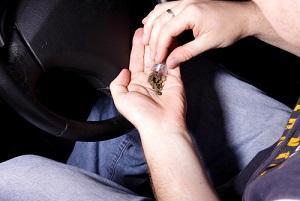Massachusetts State Police Testing Method to Fight Drugged Driving
 We all know that drunk driving is a serious problem—one that kills thousands of people each year on American roadways and injures tens of thousands more. Drunk drivers continue to cause accidents despite massive educational campaigns, clear laws, and enforcement efforts.
We all know that drunk driving is a serious problem—one that kills thousands of people each year on American roadways and injures tens of thousands more. Drunk drivers continue to cause accidents despite massive educational campaigns, clear laws, and enforcement efforts.
Over the last few years, more and more states have relaxed their laws regarding the use of a different substance that is considered by many to be as dangerous as alcohol—at least for those who are behind the wheel. The legalization of medical and recreational marijuana in states around the country has created new concerns about drugged driving and keep the roads safe. Unfortunately, there is no breathalyzer equivalent for marijuana, and it is often difficult for law enforcement to obtain solid evidence that a driver is under the influence of drugs. In neighboring Massachusetts, however, a test program is underway that could prove useful in potential drugged driving cases—including drugged driving accidents.
An Expected Surge
Voters in the Commonwealth of Massachusetts opted to legalize recreational marijuana in 2016. Officials had set a target of July 1, 2018, to begin retail sales, but there have been several obstacles that have prevented that goal from becoming reality. In the meantime, law enforcement agencies in the Commonwealth are preparing for what they believe will be a surge of stoned drivers on the streets and highways.
Last week, the Massachusetts State Police announced that they were conducting an assessment on the reliability of saliva swabs to detect the recent use of marijuana and other drugs. Police officials gathered about 170 saliva samples at roadside sobriety checkpoints and a drug treatment facility, and as of this publication, the agency was waiting for the results.
Presence not Quantity
State officials are hopeful that the saliva swab tests will be useful for officers as they attempt to determine whether a driver has used an intoxicating drug such as marijuana, heroin, and methamphetamine. The potential drawback is that the swabs will not show how much a person has used or levels of intoxication. Unlike blood-alcohol content (BAC), which is a science-backed predictor of intoxication—not to mention a legal standard in every state—the concentration of the psychoactive components of marijuana in a person’s system has not been effectively correlated with intoxication. This means that the swabs will only be part of the equation. Police officers must also use their training to recognize other signs of intoxication such as confusion, slurred speech, and decreased motor skills.
If the swabs prove to be effective in identifying what is in a person’s system, they will likely be part of the case against suspected drugged drivers in criminal proceedings. They will also probably play a role in determining liability for traffic accidents that cause injuries. For example, if police officers test every driver involved in an accident and determine that only one recently used marijuana, that driver could be held liable for all of the resulting damages.
Call Us for Help
At Woolf & Ross Law Firm, LLC, we assist injured victims in recovering the compensation they need after an accident. If you have been hurt by a driver that you believe was under the influence of drugs or alcohol, contact an experienced Connecticut personal injury attorney for help. Call 860-290-8690 for a free consultation today.
Sources:
https://www.masslive.com/news/boston/index.ssf/2018/08/massachusetts_cannabis_control.html
http://www.bostonherald.com/news/local_coverage/2018/08/state_police_testing_saliva_swab_to_catch_stoned_drivers






